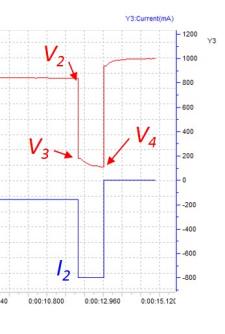DCIR Test
The internal resistance of a battery can be measured from either AC or DC test. In a DC test which is
also known as DCIR Test or simply DCIR, the battery is subjected into a very low discharge current
namely
I1 while its voltage becomes stable at let say
V1.
Then a sudden change in input current is imposed such that the current suddenly changes to
I2
in a short time with the voltage of
V2.
Then the internal resistance is:
Ri = (V2-V1)/(I1-I2)
There are different values in defferent standards for
I1, and
I2.
Therefore, you have to decide which standard you are following. For example, IEC 61960 indicates that
I1=C5 for 10 seconds and
I2=1C for 1 second. You can find
other values from different standards.
Battery and Energy Generators Research Lab,
offers the followind devices for performing DCIR test.
Characteristics
 |
Neware 5V-12Amps battery tester and cycler is capable to
obtain DCIR of any cell or battery with voltage less than 5V and the capacity up to 48Ah. The device is equipped with
sophisticated software that automatically calculates the internal resistance of the cell according to any standard.
The advantage of the device is that it calculates the DCIR of the cell with respect to its SoC by swiping it from 100%
to 0% or in any desirable range in between.
|
 |
Neware 30V-60Amps battery tester and cycler
is the same as the previous one but the voltage can reach up to 30V and the current up to 120A.
The fucntionality is the same.
|
 |
Smart Charger
has the potential to calculate the internal resistance of the cells. The main advantage of this device is that it is able to
calculate the internal resistance of individual cells that are connected in series.
|
Faculty of Mechanical Eng. of K. N. Toosi University of Technology
Vanak Square, Molla-Sadra, Pardis
Box 19395-1999
1999143344 TEHRAN
IRAN (ISLAMIC REP.)
Tell: (+98 21) 8867 4841-8 Fax: (+98 21) 8867 7274
Website: www.kntu.ac.ir
Email: mechanic@K
( Notice that to avoid spam mails, "kntu.ac.ir" is replaced with K )




